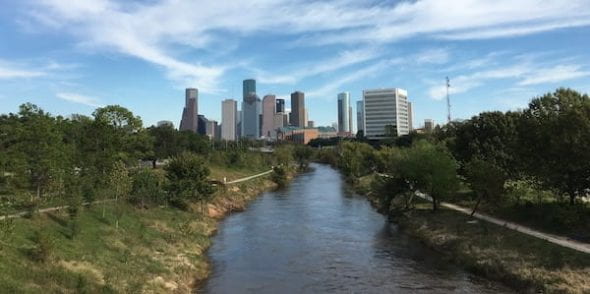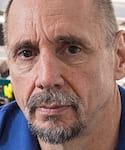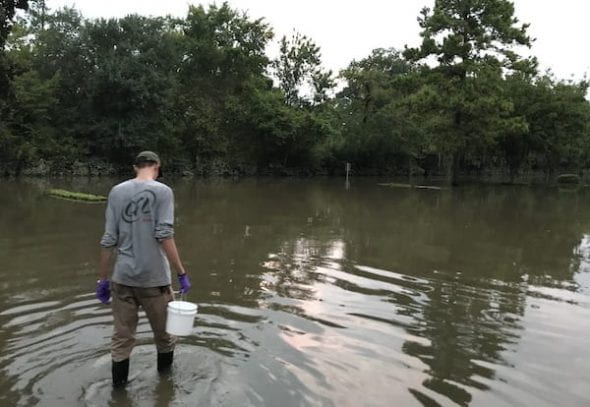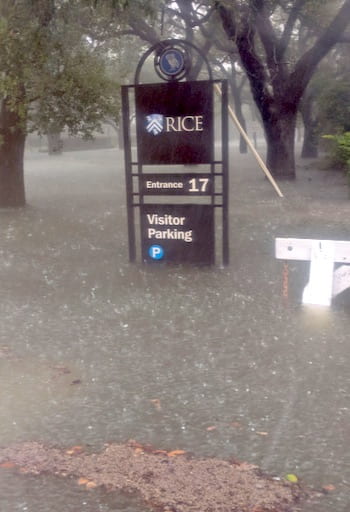
Houston’s status as the energy capital of the world, as well as its exposure to extreme flooding events in recent years, makes it a prime location for environmental studies, according to Rice University researchers. Photo by LithiumAneurym/Wikipedia
Task force eyes way to coordinate environmental initiatives, research
Houston is a unique place to generate environmental solutions. Rice University scholars in a multitude of disciplines are uniquely positioned to discover them.
That is the premise of a Rice faculty task force established to advise the Office of Research on ways to coordinate and enhance the impact of the university’s wide-ranging environmental research on campus, in the city and around the planet.
The task force headed by biogeochemist Caroline Masiello and architect Albert Pope is charged with proposing a structure, perhaps a new institute, to foster collaboration among all those who study the environment at Rice and to promote their research.

Caroline Masiello

Albert Pope
Members of the task force include Lydia Beaudrot, an assistant professor of biosciences; Joseph Campana, the Alan Dugald McKillop Chair in English and a professor of English literature; Daniel Cohan, an associate professor of civil and environmental engineering; Sylvia Dee, an assistant professor of Earth, environmental and planetary sciences; Ted Loch-Temzelides, the George and Cynthia Mitchell Chair in Sustainable Development and a professor of economics; and Laurence Yeung, an assistant professor of Earth, environmental and planetary sciences.
A groundswell of interest by faculty prompted Yousif Shamoo, vice president for research and a professor of biosciences, to form the task force to develop what he called a “comprehensive and integrated strategy for environment and global change research and scholarly activities.”
He said recent grassroots organization by Rice faculty demonstrated widespread interest in environmental challenges and the university’s contribution to solutions. Faculty from seven schools and 23 departments have begun communicating and meeting regularly to discuss an interdisciplinary vision, spurred by the creation of a group email list in spring of 2019. “It was a way of showing interest (from faculty) that Rice really needs to do more in this space,” Shamoo said. “The existence of the envirofac@rice Listserv triggered the task force.”
“Our environmental problems are at the level of complexity where the number and type of issues that have to be dealt with are interdisciplinary,” said Pope, the Gus Sessions Wortham Professor of Architecture. “You have to have a number of voices.

Rice graduate student Seth Pedersen collects a water sample near Cypress Creek. A task force at the university is looking for ways to coordinate collaborative environmental research. Photo by Qilin Li
“These problems can’t be solved in a silo,” he said. “They’re complex problems that have as much to do with lifestyle and technology as they do with science.”
Masiello, a professor of Earth, environmental and planetary sciences, said the task force isn’t interested in competing with other organizations on campus. “We’re looking to create something that provides more resources, coordinates and creates more opportunities for faculty,” she said. “We want a network to support and connect and make us better than the sum of our parts.” To that extent, the environmental faculty group conducted a survey this summer to assess current faculty scholarship in the area of the environment, as well as faculty aspirations for growth.
Masiello said the initiative is also a clear response to something students want. “During O-Week we queried freshmen and 52% indicated they want to study climate change as part of their classes,” she said.
“It’s important that we equip students with the skills to be successful in the world that’s coming,” Masiello said. “This generation of undergrads is going to live through some of the biggest environmental changes that humans have ever experienced.”

Rice campus flooding during Hurricane Harvey. Courtesy of RUPD
“I can’t think of anything more at the core of our mission than undergraduate education,” Pope added. “It’s very clear that students are going to need to understand and anticipate the changes coming at them.”
Pope noted Houston’s unique qualities as a setting for environmental research. “Obviously since Hurricane Harvey, climate change and environmental issues have become increasingly important to the city’s future,” he said. “We have over 100,000 structures — that’s a modest estimate — that presently exist in the 100-year flood plain. And we had 500-year storms three years in a row.
“There are things about Houston that make it especially interesting in light of our environmental problems,” Pope said. “We are the very core of the carbon economy in this country. And Rice is the premier research institution in this city. That gives us the ability to engage issues in a way that if you were in California or New York wouldn’t have the same effect.”
Masiello noted that a recent report by the University of Michigan, commissioned by the University of Texas at Austin with support from the Mitchell Foundation, outlines a set of organizing principles for interdisciplinary sustainability institutes at major research universities.
“We’re fortunate that this report already did a lot of legwork on how these types of institutes succeed,” she said. “From our survey we know where faculty strengths are and what faculty are interested in doing. One thing the report made clear is that any institute lives and dies on the successes of its faculty, so faculty engagement is crucial.”
The task force expects to deliver recommendations in line with Rice’s Vision for the Second Century, Second Decade. While a timeline has not been set, Shamoo expects it to act with haste.
“I’ve told them the reason it’s a task force is that they have to end quickly and generate a report with recommendations,” he said. “They cannot become a perpetual meeting society, which is something we academics love to do.”
Shamoo also expects the coterie of junior faculty involved in the environmental faculty group to continue pushing for progress.
“They don’t take no for an answer,” he said. “They want things to happen now — and to be clear, that’s great. That’s why they’re here.”

